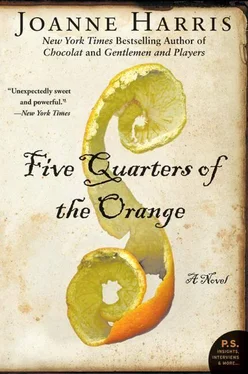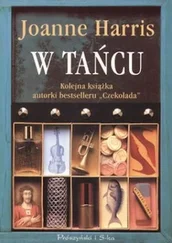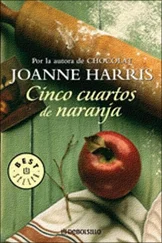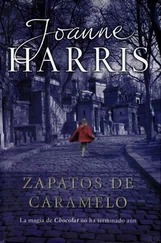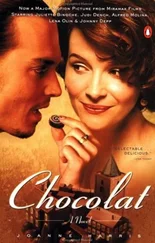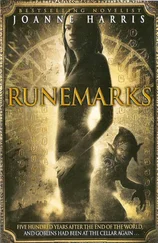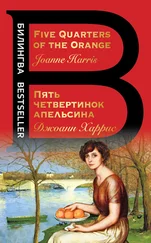“I would,” I repeated softly. “I’d throw you back.”
But if it had been there at all, it wasn’t now. Beside me a frog belched suddenly, absurdly. It was getting cold. I turned and went back across the fields the way I came, picking a few ears of corn to excuse my late arrival.
After a while I began to smell the pavé cooking, and I quickened my step.
I‘ve lost her. I’m losing them all.
It’s there in my mother’s album opposite a recipe for blackberry cake, tiny migraine-letters in black ink, the lines crossed and recrossed as if even the code in which she writes is not enough to hide the fear she hides from us and from herself.
She looked at me today as if I wasn’t there. Wanted so hard to take her in my arms but she’s grown so much and I’m afraid of her eyes. Only R-C keeps a little softness but Fra doesn’t feel like my child any more. My mistake was thinking children were like trees. Prune them back and they’ll grow sweeter. Not true. Not true. When Y. died I made them grow up too fast. Didn’t want them to be children. Now they’re harder than me. Like animals. My fault. I made them that way. Oranges in the house again tonight, but no one smells them but me. My head aches. If only she could put her hand on my forehead. No more pills. The German says he can get some more, but he doesn’t come. Boise. Late home tonight. Like me, divided.
It sounds like gibberish, but her voice in my mind is suddenly very clear. It is sharp and plaintive, the voice of a woman hanging on to her sanity with every bit of her strength.
The German says he can get some more, but he doesn’t come.
Oh, Mother. If only I’d known.
Paul and I read through the album little by little during those lengthening nights. I deciphered the code while he wrote down and cross-referenced everything by means of small cards in order to try to put events in sequence. He never commented, not even when I passed over certain sections without telling him why. We averaged two or three pages a night, not a great deal, but by October we had covered almost half the album. For some reason it seemed a less arduous task than when I’d tried it alone, and we would often sit late into the night remembering the old days of the Lookout Post and the rituals at the Standing Stones, the good days before Tomas. Once or twice I even came close to telling him the truth, but I always stopped just in time.
No. Paul mustn’t know.
My mother’s album was only one story; one with which he was already partly familiar. But the story behind the album…I looked at him as we sat together, the bottle of Cointreau between us and the copper pot of coffee simmering on the stove behind. Red light from the fire lit his face and outlined his old yellow mustache in flame. He caught me looking at him-seems he does that more and more often nowadays-and smiled.
And it wasn’t so much the smile as something behind the smile-a look, a kind of searching, wry look-that made my heart beat faster and my face flush with something more than the heat of the fire. If I told him, I thought suddenly, that look would go from his face. I couldn’t tell him. Not ever.
When I came in the others were already at table. Mother greeted me with her strange, forced cheeriness but I could tell that she was at the end of her tolerance. The smell of orange stung my sensitized nostrils. I watched her intently.
We ate in silence.
The celebration dinner was heavy, like eating clay, and my stomach rebelled against it. I pushed food about on my plate until I was sure she was looking elsewhere, then transferred it into my apron pocket for later disposal. I need not have worried. In the state she was in, I don’t think she would have noticed if I’d thrown it against the wall.
“I smell oranges.” Her voice was brittle with desperation. “Has any of you brought oranges into the house?”
Silence. We looked at her blankly, expectant.
“Well? Have you? Brought oranges?” Voice rising now, a plea, an accusation.
Reine looked at me suddenly, guilty.
“Of course not.” I made my voice flat and sullen. “Where would we get oranges?”
“I don’t know.” Her eyes were narrow with suspicion. “The Germans, perhaps. How should I know what you do all day?”
This was so close to the truth that for a moment I was startled, but I didn’t let it show. I gave a shrug, very conscious of Reinette watching me. I shot her a warning look.
Give the game away, would you?
Reinette turned back to her cake. I kept on watching my mother. Staring her out. She was better at it than Cassis, her eyes expressionless as sloes. Then she stood up abruptly, almost knocking over her plate and half-dragging the tablecloth with her.
“What are you staring at now?” she cried at me, stabbing at the air with her hands. “What are you staring at, damn you? What is there to see?”
I gave another shrug. “Nothing.”
“That isn’t true.” Voice like a bird’s, sharp and precise as a woodpecker’s beak. “You’re always staring at me. Staring. What at? Thinking what, you little bitch?”
I could smell her distress and fear, and my heart swelled with victory. Her eyes dropped from mine. I did it, I thought. I did it. I won.
She knew it too. She looked at me for another few seconds, but the battle was lost. I gave a tiny smile, which only she could see. Her hand crept to her temple in the old gesture of helplessness.
“I have a headache,” she said with difficulty. “I’m going to lie down.”
“Good idea,” I said tonelessly.
“Don’t forget to wash the plates,” she said, but it was only noise. She knew she’d lost. “No putting them away still wet. No leaving-” Then she broke off, silent, staring into space for half a minute. A statue frozen midmovement, mouth half open. The rest of the sentence hung between us for an uneasy half-minute.
“Plates on the draining board all night,” she finished at last, and stumbled off down the passageway, pausing once to check the bathroom, where there were no more pills.
We-Cassis, Reinette and I-looked at one another.
“Tomas said to meet him at La Mauvaise Réputation tonight,” I told the others. “He said there might be some fun.”
Cassis looked at me. “How did you do that?” he said.
“Do what?” I echoed.
“You know.” His voice was low and urgent, almost fearful. In that moment he seemed to have lost all authority over us. I was the leader now, the one to whom the rest would look for guidance. The strange thing was that though I realized this at once, I felt scarcely any satisfaction. There were other things on my mind.
I ignored his question. “We’ll wait until she’s asleep,” I decided. “An hour, maybe two at most. Then we’ll make our way across the fields. No one will see us. We can hide out in the alley and watch out for him.”
Reinette’s eyes lit up, but Cassis looked skeptical. “What for?” he asked at last. “What are we going to do when we get there? We’ve got nothing to tell him, and he already left the film magazines-”
I glared at him. “Magazines,” I snapped. “Is that all you ever think about?”
Cassis looked sullen. “He said something interesting might happen,” I said. “Aren’t you curious?”
“Not really. It mightn’t be safe. You know what Mother-”
“You’re just chicken,” I said fiercely.
“I’m not!” He was, though. I could see it in his eyes.
“Chicken.”
“I just don’t see the point in-”
“Dare you,” I said.
Читать дальше
